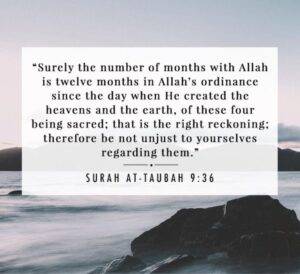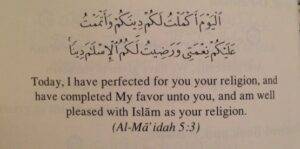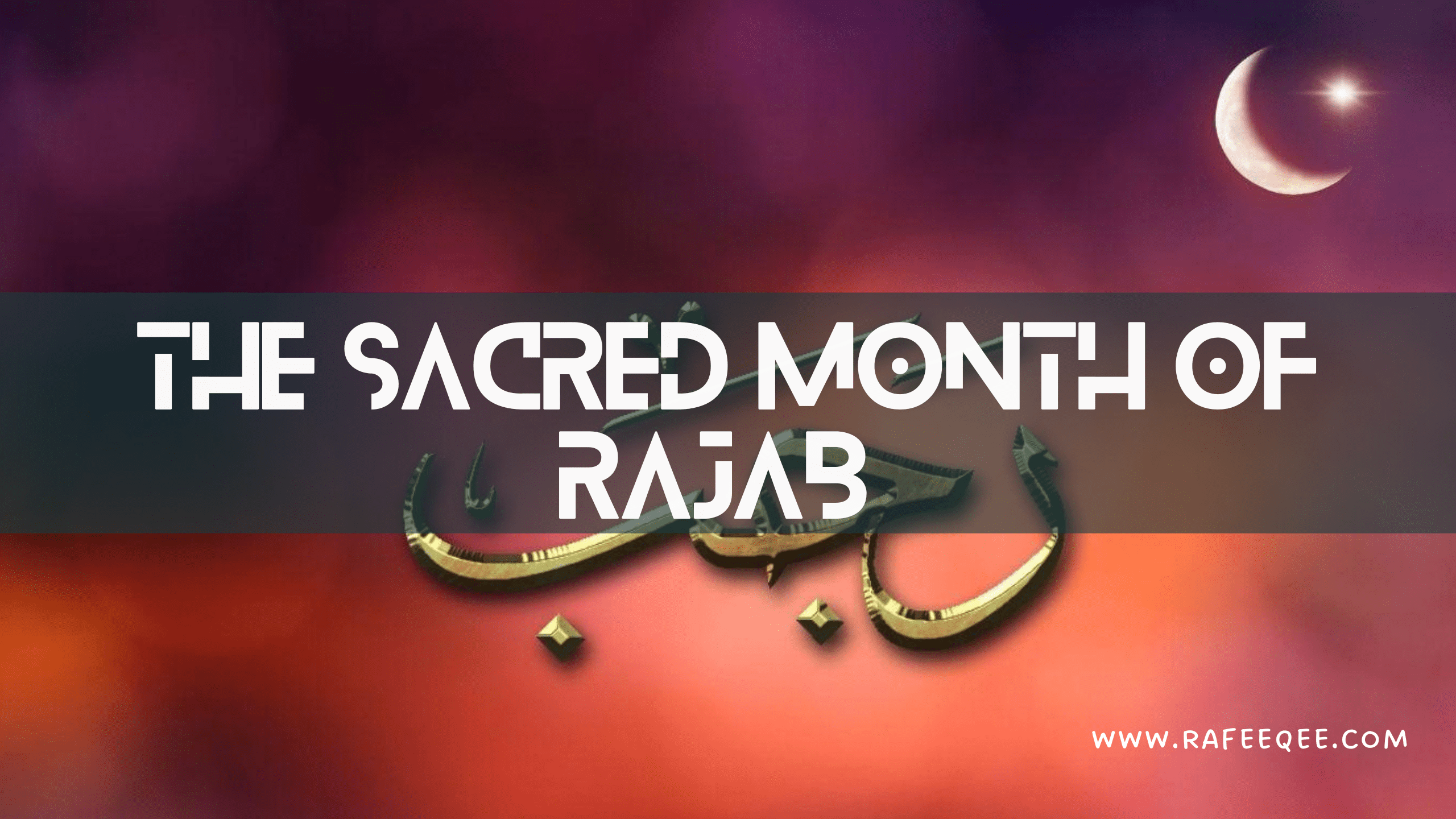Islamic Principles, Religion
THE SACRED MONTH OF RAJAB-DOS & DON’TS
The word “Rajab” comes from the word At-Tarjeem, which means exaltation because the people of Jaahiliyyah used to honor it by sheathing their swords and shunning wars. It was called Rajab because it is held in high esteem and also venerated in Sharee’ah. Al-Bayhaqi said: the people of the jahiliyyah used to venerate these sacred months, especially the month of Rajab, and they would not fight during this month. Similarly, Islam also regards Rajab as a sacred month and prohibits sins, just like every other month. Allah says:
“Verily, the number of months with Allaah is twelve months (in a year), so it was ordained by Allaah on the Day when He created the heavens and the earth; of them four are Sacred. That is the right religion, so wrong, not yourselves therein…” [at-Tawbah 9:36]

Although the Sacred Months are implicitly acknowledged in the Qur’an their names have been stated in the Sunnah.
The Prophet ﷺ gave his Farewell Sermon and said:
“Time has completed its cycle and is as it was on the Day when Allaah created the heavens and the earth. The year is twelve months, of which four are sacred, three consecutive months – Dhu’l-Qa’dah, Dhu’l-Hijjah, and Muharram – and the Rajab of Mudar which comes between Jumaada and Sha’baan.” (Reported by Al-Bukhari)
So, Rajab is one of these sacred months and it has a special status that also attaches to it. Since Allaah has given these four months particular status and barred us from sinning during them out of respect for their holiness, we should be cognizant of their sanctity since sins committed during this period are much worse due to the sanctity of the time that Allaah has designated as sacred. These months are called sacred for two reasons:
- Because of the prohibition on fighting during them, unless the enemy starts it.
- Because transgressing the sacred limits during them is more grievous than at other times.
So Allah, forbade us to commit sin during these months, as He says: “{so do not wrong yourselves during them} [at-Tawbah 9:36]. Although committing sin is forbidden and prohibited during these months and others, in these months it is more emphatically prohibited.
Therefore, We should realize that believers are forbidden to do injustice in this sacred month of Rajab and it is forbidden to defy Allah’s limitations, it is expected to carry out His laws, and to be careful not to transgress and fall into sins. Fighting during the sacred months and wronging ourselves -sins are all forbidden in this sacred month of Rajab.
Dos and Bid’ah (Religion Innovation) in the Month of Rajab
DOS
- The month of Rajab marks the beginning of preparations for Ramadan. Preparing to perform good deeds before the month of Ramadan is one of the most crucial things and the commencement of the preparations for Ramadan was confirmed by the scholars to be the month of Rajab.
Therefore, we need to prepare ourselves by performing good deeds in Rajab and paying close attention to making them perfect in Sha’baan so that we can perform them flawlessly in Ramadan. The month of Rajab marks the beginning of preparations for Ramadan. Preparing to perform good deeds before the month of Ramadan is one of the most crucial things and the commencement of the preparations for Ramadan was confirmed by the scholars to be the month of Rajab.
Therefore, we need to prepare ourselves by performing good deeds in Rajab and paying close attention to making them perfect in Sha’baan so that we can perform them flawlessly in Ramadan. - Abu Bakr al-Warraaq al-Balkhi said: The month of Rajab is a month for sowing, the month of Sha‘baan is a month for irrigating the crop, and Ramadan is a month for harvesting the crop. And it was narrated that he said: The likeness of the month of Rajab is that of the wind, the likeness of Sha‘baan is that of a cloud, and the likeness of Ramadan is that of the rain.
- Rajab is the month of those who are excelling, Sha‘baan is the month of those whose progress is moderate, and Ramadan is the month of the sinners [in which they can mend their ways].
- Dhu’n-Noon al-Masri (may Allah have mercy on him) said: He (may Allah have mercy on him) also said: Rajab is the month of planting, Sha‘baan is the month of irrigating, and Ramadan is the month of harvesting. Everyone will reap what he sowed and will be required for what he did, so the one who neglects his crops will feel regret on the day of harvest, and he will not get what he was expecting.
- Ibn Rajab said in Lataa’if al-Ma‘aarif (121): The month of Rajab is the key to the months of goodness and blessing.
- One of the sacred months has come, so the one who calls upon Allah will not be disappointed.
- Glad tidings to the one who does a sincere righteous deed in this month and gives up obscenity and dubious matters during it. Making the most of this opportunity by striving during this month is gain, and making the most of its time by doing acts of worship and obedience is immense virtue.
So, these are some of the important things Muslims should focus on during the sacred month to allow them to sow a lot of good seeds and do a lot of righteous deeds. These are the seeds that he should plant during his lifetime, hoping for the day of harvest when he meets the Lord of the Worlds with a crop of good deeds.
DON’TS/ BID’AH IN THE MONTH OF RAJAB
Bid’ah (Religious Innovation) is a serious issue that contradicts the Qur’an and the Sunnah. Islam, the best Religion has been perfected by the Almighty Allah to our beloved Messenger before he dies. Allah says:
“… This day, I have perfected your religion for you, completed My favor upon you, and have chosen for you Islam as your religion…” [al-Maa’idah 5:3]

The Messenger of Allaah ﷺ said:
“Whoever innovates something in this matter of ours, which is not a part of it, will have it rejected.” (Agreed upon).
According to another report ﷺ:
“Whoever does an action which is not a part of this matter of ours will have it rejected.”
(Muslim)
Some of the innovated numbers of practices in Rajab include the following:
- Salaat al-raghaa’ib is bid’ah according to the consensus of the scholars of religion. It is one of the innovations (bid’ahs) that have been introduced in the month of Rajab. It is done on the night of the first Friday in Rajab, between Maghrib and ‘Isha’, and is preceded by fasting on the first Thursday of Rajab. Al-Nawawi also said in Sharh Muslim: May Allaah curse the one who fabricated and introduced that, for it is a reprehensible innovation, one of the innovations which constitute misguidance and ignorance, and it involves obvious evils. Several imams have written valuable works explaining that those who offer this prayer and the one who invented it are misguided.
- The du’aa’s which are recited specifically during Rajab are all fabrications and innovations.
- Fasting specifically in Rajab: There is no authentic report from the Prophet ﷺ or from the Sahaabah to indicate that there is any particular virtue in fasting during Rajab. The fasting that is prescribed in Rajab is the same as that prescribed in other months, namely fasting on Mondays and Thursdays, and the three days of al-Beed, fasting alternate days. In Fataawa al-Lajnah al-Daa’imah it states: with regard to fasting specifically in Rajab, we do not know of any basis in Sharee’ah for doing that.
- Imaam Ibn al-Qayyim said: the Prophet (peace and blessings of Allaah be upon him) did not fast for three consecutive months (i.e., Rajab, Sha’baan, and Ramadaan) as some people do, and he never fasted Rajab at all, nor did he encourage people to fast this month.
- Visiting graves specifically in Rajab is bid’ah because graves are to be visited at any time of the year.
- The recitation of the story of the Mi’raaj, and celebrations to commemorate it on the twenty-seventh of Rajab are innovations.
- Singling out the night twenty-seventh of Rajab to perform extra acts of worship such as Qiyaam al-Layl.
- Singling out the month of Rajab for doing ‘Umrah frequently. The scholars denounced this practice, Shaykh Muhammad ibn Ibraaheem (may Allaah have mercy on him) said in his Fataawaa: “As for singling out some of the days of Rajab for any kind of good deed, ziyaarah (visiting the House of Allaah, the Ka’bah) or anything else, there is no basis for this…” But if a person goes for ‘Umrah during Rajab without believing that this has any particular virtue and because it is just a coincidence that it is easier for him to go at this time, then there is nothing wrong with that.
May Allaah ‘Azza wajall bestow upon us the best of health and fortune to observe the upcoming blessed month of Ramadaan as well as the ability to remain steadfast in upholding justice.

